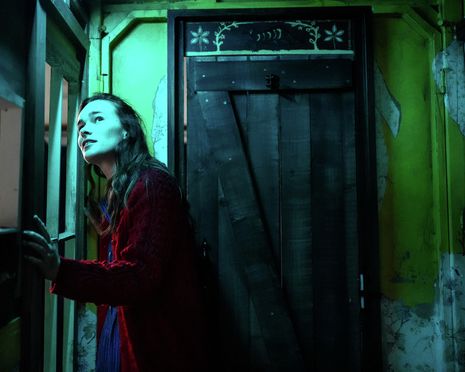Home floods the stage with climate change realities
Eva Weinstein talks to Temper Theatre’s Artistic Director Finn Morrell about the Fens, flooding a stage, and coming home

In a world awash with images of climate change and floods, we are inundated with distant spectacles, sensationalised narratives, and a pervasive feeling of detachment from dramatic natural disasters. Often occurring halfway across the world, we are presented with an environmental thriller: stakes are high, but personal connection remains elusive. But what if these floodwaters aren’t just distant crises, but a tide that threatens the very foundations of all our homes? Enter Temper Theatre’s latest production, Home. A theatrical exploration of identity, climate change, and the ever-evolving concept of home, this play promises to dismantle the detachment, bringing the floodwaters – quite literally – closer to home.
Home is rooted in the personal journey of Temper Theatre’s Artistic Director Finn Morrell, and his childhood home in the Fens. As the creative world came to a standstill during the pandemic, Finn found himself back at his family home, “packing up childhood boxes” to help his parents move house. “I always thought the Fens was a kind of dead-end place of no opportunity” Finn tells me, “I thought that the world was bigger and brighter than this place.” It is surprising, then, that inspiration for this production should stem from the very place Finn found unexciting, and that the Fens should so perfectly encapsulate the global phenomenon of climate change and its localised impacts.
"A theatrical exploration of identity, climate change, and the ever-evolving concept of home"
Upon his return home, Finn began researching the rich folklore and magic of the Fenlands and became fascinated with the landscape. What is now a flat agricultural region of East Anglia was, no less than five hundred years ago, a water-logged wetland, full of marshes and rivers “more akin to an Amazonian Delta.” But this environment is not just a distant memory; it is a worryingly possible future. After talking with the Environmental Agency, Finn was “hit by a wave of anxiety” at the prospect of a changing Fenlands, struck by information on flooding risks to the low-lying farmlands, parts of which lie below mean global sea levels. Despite much of his previous work drawing inspiration from climate change, socio-political issues, nature and the environment, Finn reveals that Home is the “first time I’ve really looked at my own locality of it all”, tackling the vastness of the climate crisis in a familiar environment. The production’s ability to combine a deeply personal narrative with global environmental concerns may well pave the way for a broader appreciation of eco-theatre.
"This environment is not just a distant memory; it is a worryingly possible future"
Home follows the story of the protagonist Imogen, who returns to the Fens after receiving urgent news from her father. Imogen’s story is “essentially a reflection of my own experience of feeling quite apathetic, stressed and busy in London, and kind of forgetting my roots and where I’m from.” Finn pulls the story into a world of fiction, creating a play filled with colour and drama, following Imogen on a surreal Alice in Wonderland-esque journey back through her childhood. Featuring a flood, a tragedy, and emotional events that have shaped her life, Finn explains that many encounters in the play are “inspired by real curiosities or fears about losing someone or losing a house because of flooding.” The play endeavours to humanise flooding, peering beyond statistics and data to reveal the lived experience and stories of families and communities.
The performance features an impressive full-stage flood sequence. Temper Theatre’s innovative staging, marked by intense lighting and physical theatre inspired by renowned theatre companies like Gecko and Hofesh, creates a multi-sensory experience. Without giving too much away, Finn hints that we will see “a house that splits and turns and twists and tips, and there’s marsh and smoke and wind.” The ambitious production promises to bring the house to life: “the chimney smokes, the fan turns the light, there’s lights inside the pods that change colour.” The set is a living entity. A microcosm of the wider world that evolves, breathes, and reacts to external forces, and a powerful metaphor for the ever-changing nature of our environment.
"The set is a living entity"
With an intentionally international cast, Home extends its narrative beyond the Fens. Performers from China, Japan and Sweden bring diverse perspectives to the fore; while the story is local, themes surrounding climate change resonate with a global audience. “You might hear in the sound design, occasionally the radio frequencies just tuning into different parts of the world that are also suffering from flooding” Finn reveals. “You don’t need to be able to speak English to understand the show. You can watch it, not hear any of the dialogue, and still understand it.”
Founded in Cambridge ten years ago, Temper Theatre’s return to the city is poignant. For the director, home is a concept in flux, constantly shifting and adapting to life’s experiences. “Home is transient”, he notes. The play is fundamentally concerned with this fluidity - the tangible movement of water and flooding, and the constant change brought about by the tides of time and climate change. In the wake of Storm Henk, which prompted over six hundred flood warnings across England and Wales, Home could not be more timely. Temper Theatre’s Home promises to be more than a play; it is a “conversation starter”, a catalyst for introspection, and a confluence of the personal and the global.
Home is showing at Elysium Hall, Ely on the 23rd January, and The Robinson Theatre, Cambridge on the 25th January
 News / Judge Business School advisor resigns over Epstein and Andrew links18 February 2026
News / Judge Business School advisor resigns over Epstein and Andrew links18 February 2026 News / Gov grants £36m to Cambridge supercomputer17 February 2026
News / Gov grants £36m to Cambridge supercomputer17 February 2026 News / Hundreds of Cambridge academics demand vote on fate of vet course20 February 2026
News / Hundreds of Cambridge academics demand vote on fate of vet course20 February 2026 News / CUCA members attend Reform rally in London20 February 2026
News / CUCA members attend Reform rally in London20 February 2026 News / Union speakers condemn ‘hateful’ Katie Hopkins speech14 February 2026
News / Union speakers condemn ‘hateful’ Katie Hopkins speech14 February 2026










